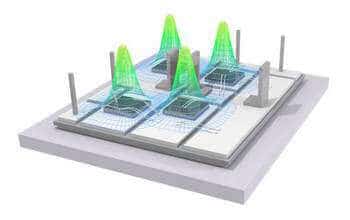The National Science Foundation (NSF) has invested $55.5 million in three new Engineering Research Centers (ERCs) to create novel technology platforms and transform industries. These three ERCs will address national challenges in energy, sustainability and infrastructure.
Over the next five years, these flagship centers will generate knowledge and high-tech innovations while contributing to U.S. economic opportunities and the preparation of engineering graduates.
“The Engineering Research Centers program is one of NSF’s signature activities, with far-reaching effects on future technology and innovation,” says Pramod Khargonekar, NSF assistant director for engineering. “The ERCs combine multi-disciplinary research excellence with broad academic and industry experience, and provide unique environments to educate the engineering leaders of tomorrow.”
Innovations that improve the affordability, availability, quality and resilience of infrastructure services will enhance the nation’s economic competitiveness and societal well-being.
Compact mobile power
The NSF Engineering Research Center for Power Optimization for Electro-Thermal Systems (POETS) will be led by the University of Illinois at Urbana-Champaign in partnership with Howard University, Stanford University and the University of Arkansas (NSF award #1449548).
The POETS ERC aims to pack more power into less space for electrical technologies on the move by integrating novel 3-D cooling circuitry, power converters and algorithms for smart power management. Their work will enable the manufacture of lighter, more compact and more efficient power electronic systems for cars, airplanes, construction equipment, handheld tools and other mobile applications.
Off-grid drinking water
The NSF Nanosystems Engineering Research Center for Nanotechnology Enabled Water Treatment Systems (NEWT) will be led by Rice University in partnership with Arizona State University, the University of Texas at El Paso and Yale University (NSF award #1449500).
The NEWT Nanosystems ERC will pursue high-performance and easy-to-deploy water treatment systems that can turn both wastewater and seawater into clean drinking water. The modular treatment systems, which will need less energy and fewer chemicals, will safely enlist the selective properties of reusable engineered nanomaterials to provide clean water at any location or scale.
Nature-inspired soil engineering
The NSF Engineering Research Center for Bio-mediated and Bio-inspired Geotechnics (CBBG) will be led by Arizona State University in partnership with the Georgia Institute of Technology, New Mexico State University, and the University of California, Davis (NSF award #1449501).
The CBBG ERC will investigate natural underground biological processes to engineer the ground in ways that reduce construction costs and environmental impacts, while mitigating natural hazards and existing environmental degradation. Transformational new ground engineering methods will improve the sustainability and resiliency of civil infrastructure systems, including bridges, buildings, underground construction and resource exploration.
Collaborative partnerships
The NSF ERCs collaborate with international university partners and American technology companies, large and small, to conduct translational research and prepare U.S. engineering students to successfully participate in the global economy.
“Since 1985, NSF’s ERC program has established extensive, multidisciplinary collaborations to create technological breakthroughs for new products and services such as surgical robots, mobile communication, renewable energy and advanced prosthetics,” says Don Millard, acting division director for the NSF Division of Engineering Education and Centers.
Including these three new fiscal year 2015 awards, NSF supports 20 ERCs in the areas of advanced manufacturing; biotechnology and health care; energy, sustainability and infrastructure; and microelectronics, sensing and information technology.


